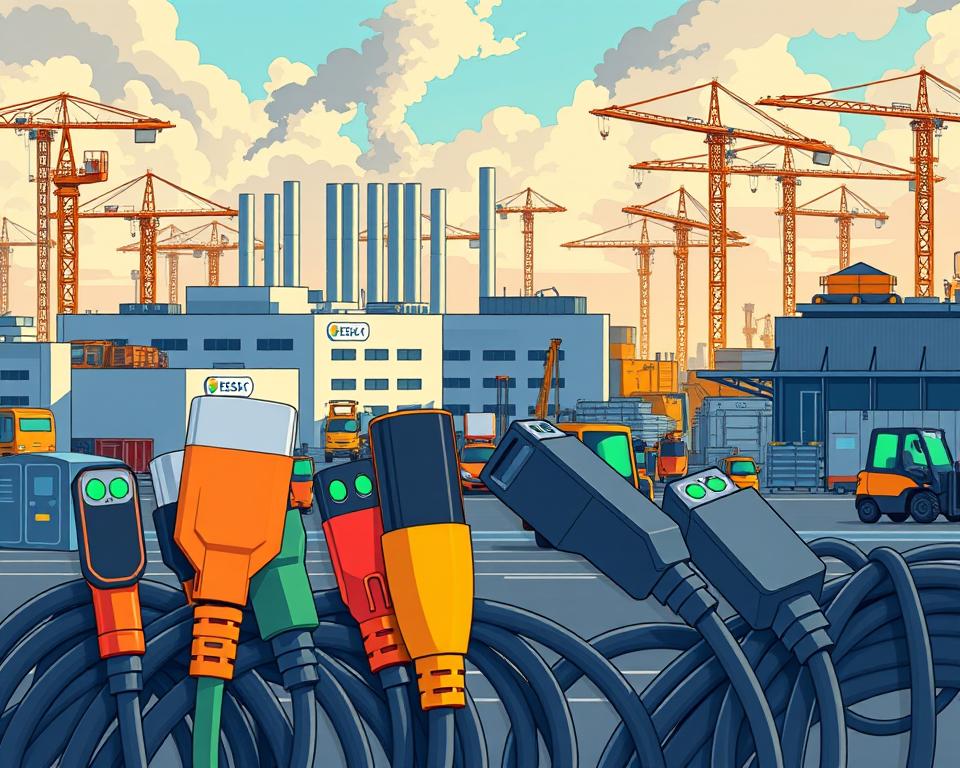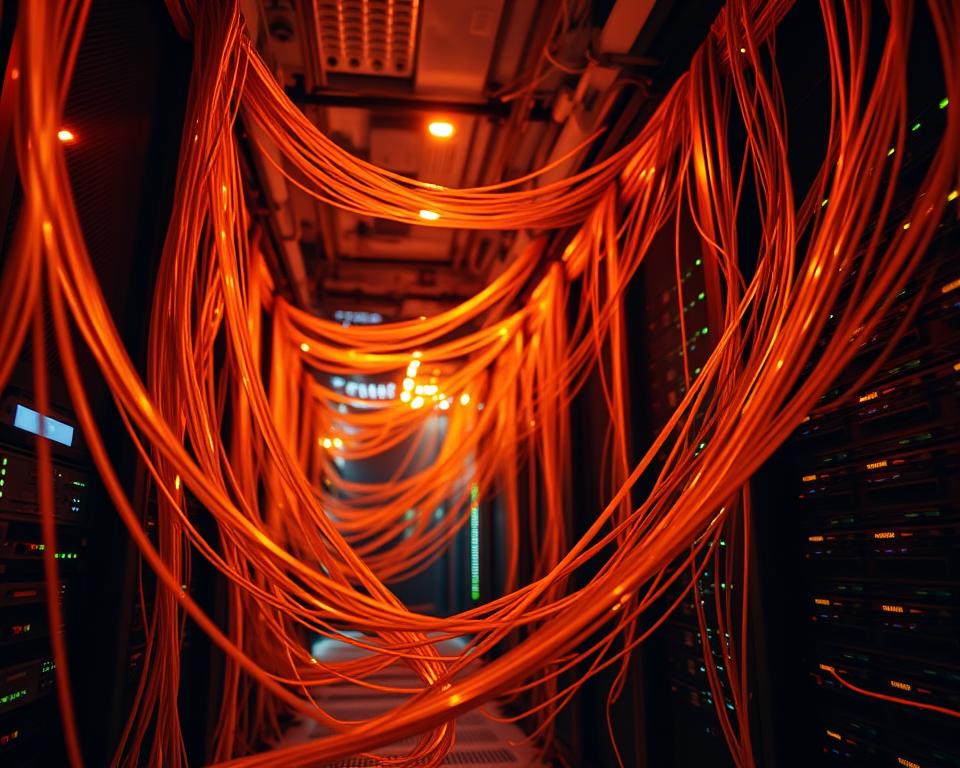Leading EV Charging Cable Manufacturers for Your EV
The electric vehicle industry is on the rise, with the demand for reliable and efficient charging solutions increasing sharply. Currently, industry leaders have been at the vanguard of this change, providing top-tier charging infrastructure. Southwire, for instance, has been a significant player since 2014, boasting over 1000 five-star reviews and 75 years of experience in the electrical construction industry.
The surge in electric vehicle adoption necessitates the need for durable, rapid, and reliable Charger Manufacturers in China. Top manufacturers are innovating to meet these evolving needs, offering products that boost the overall charging experience.
Grasping the differences between various charging solutions matters for making informed decisions. High-grade charging infrastructure directly influences vehicle performance and customer satisfaction.
Core Lessons
- Key suppliers deliver top-tier cables enhancing lifespan and protection.
- Growing EV adoption fuels demand for fast, reliable infrastructure.
- Industry leaders develop cutting-edge products for EV drivers.
- Premium cables enhance both charge rate and vehicle function.
- Opting for top-tier cables yields future savings.

Why High-Quality EV Cables Matter
With EVs on the rise, the significance of high-quality EV charging cables is undeniable. The performance, security, and reliability of electric vehicle charging systems rest on the quality of the charging cables used.
How EV Charging Tech Has Advanced
Electric vehicle charging technology has undergone significant advancements in recent years, with a shift toward faster charging speeds and enhanced protections. Today’s EV charging cables are designed to meet these evolving needs, incorporating high-grade materials and advanced designs to minimize power loss and maximize charging efficiency.
The Case for Premium Charging Infrastructure
High-grade cables ensure reliable, safe charging. Durable features, such as all-weather performance and flexibility in extreme temperatures, ensure reliable operation across various environments. Additionally, meeting standards and adherence to industry guidelines are essential in guaranteeing safe operation.
| Key Features | Benefits |
|---|---|
| Superior materials and construction | Minimized power loss during energy transfer |
| Robust durability | Weather resistance, flexibility in extreme temperatures |
| Regulatory compliance | Rigorous safety requirements met |
| Serviceability | Repairable design for longevity |
Products from Aichie Tech Electronics pass The Cable Lab’s stringent tests. By opting for serviceable Portable EV Charger, repairable designs reduce lifetime costs, reducing waste and protecting the planet.
China’s Leading EV Cable Makers
A surge of cable makers in China supports the EV boom. These companies are crucial in supporting the expanding electric vehicle (EV) market, offering premium charging cables designed for different applications.
Wottz – Pioneers in EV Cables Since 2014
Wottz has established itself as a prominent player in the EV charging cable market since 2014. They offer a range of cables that cover Mode 1–4 charging standards, including Mode 1, 2, 3, and fast-charging Mode 4 DC Charging.
Aichie Tech Electronics: 75+ Years of Electrical Expertise
Aichie Tech Electronics leverages 75 years of electrical expertise in its EV cables. Their products are designed to meet the demands of both domestic and commercial EV charging infrastructure.
Other Notable Manufacturers in the Market
Beyond industry leaders like Wottz and Southwire, other manufacturers are making their mark by focusing on specific automotive applications or technological innovations in electric vehicle charging. These include specialists in Type 1 (J1772) and Type 2 (Mennekes) connectors, as well as companies developing cables with enhanced flexibility and resistance to environmental factors.
A Guide to EV Cable Types
As electric vehicles become increasingly popular, understanding the various types of EV Charging Cable Manufacturers is crucial for optimal charging experiences. Knowing cable types ensures you pick the right charger. The diversity in EV charging infrastructure necessitates a closer look at the cable options.
Type1 vs. Type2 Charging Cables
SAE J1772 (Type 1) and Mennekes (Type 2) are the main global standards. Type 1, also known as SAE J1772, is predominantly used in North America, while Type 2, or Mennekes, is the standard in Europe. The choice between these cables depends on the vehicle’s connector type and the charging station’s compatibility. Type 2 cables often support higher charging capacities, making them suitable for faster charging.
AC Level2 vs DC Fast Charging
Level2 charging cables offer faster charging than Level1, using 240V AC power to deliver up to 19.2 kW of power. DC Fast Charging cables, on the other hand, enable quick top-ups by on-site AC→DC conversion, allowing for much faster charging times. These cables are key for highway charging, enabling drivers to recharge quickly.
Portable vs Fixed Cables
Portable EV charging cables, such as “Granny chargers,” offer flexibility by allowing owners to charge their vehicles from standard household outlets. Tethered cables are fixed to charging stations, offering ease at the cost of portability. The choice depends on the owner’s charging needs and preferences.
When selecting an EV charging cable, factors such as cable length, charging speed, and compatibility with the vehicle are crucial. For instance, portable charging cables range from basic Level1 emergency chargers to more robust Level2 solutions. Vehicle-to-load (V2L) cables represent an emerging category, enabling EVs to power external devices.
- Flexible granny chargers and L2 units suit various needs.
- Fixed cables add convenience, removing cable management tasks.
- Lengths vary from 5 m to 50 m—choose wisely.
Key Features of High-Quality EV Charging Cables
High-quality EV charging cables are distinguished by several key features that ensure reliable and safe charging. These features are vital to safe, efficient charging.
Robustness and Weatherproofing
Durability and weather resistance are paramount in EV charging cables. Manufacturers like Wottz and Southwire use RoHS-compliant recyclable compounds, ensuring they withstand various environmental conditions. Their serviceable design facilitates easy maintenance and promotes recycling.
Maneuverability and Convenience
Flexibility and ease of use are also critical factors. High-quality EV charging cables are built for easy handling without sacrificing strength. This flexibility is combined with rugged construction for lasting performance.
Certified Safety and Standards
Approved safety marks ensure reliable performance. They ensure their products meet or exceed standards such as IEC62196 for connectors and UL2594 in North America. Rigorous third-party testing evaluates electrical safety, mechanical durability, and environmental resistance.
| Certification | Description | Region |
|---|---|---|
| IEC62196 | Connector safety standards | International |
| UL2594 | Standard for electric vehicle supply equipment | North America |
| ROHS | Restriction of hazardous substances | International |
By focusing on these key features, manufacturers can provide EV charging cables that not only meet the highest quality and safety standards but also enhance the overall user experience.
Cutting-Edge EV Cable Innovations
The latest developments in EV charging cable technology are revolutionizing the way we charge our vehicles, with a focus on ultra-fast charging, reliable data transfer, and eco-friendly materials.
Liquid-Cooled Charging Cables for Ultra-Fast Charging
Cooling fluids enable higher charge rates, enabling electric vehicles to charge at significantly higher speeds without overheating.
Hyperboloid Contacts and Enhanced Signal Integrity
Hyperboloid contacts are being integrated into EV charging cables to enhance signal integrity, ensuring reliable and efficient data transfer during the charging process.
Eco-Friendly Cable Compounds
Leading manufacturers are prioritizing sustainability in their cable designs, using recyclable materials and eco-friendly compounds that reduce environmental impact. For instance, companies like Aichie Tech Electronics and Wottz are embracing repairable designs and strict standards to foster reuse.
The industry’s shift towards sustainability includes the use of TPU jackets, avoidance of hazardous substances, and the development of take-back programs for end-of-life disassembly and material recovery.
Choosing the Perfect EV Cable
Choosing the right EV charging cable is crucial for efficient and safe charging. To make an informed decision, consider several key factors.
Matching Cable to Vehicle
Verify your car’s inlet and cable plug match. Your vehicle’s onboard charger capacity sets the upper limit for AC power.
Picking the Right Cable Length
Choose a cable length that suits your charging needs. A longer cable adds reach at the cost of extra weight.
Considering Power Requirements and Charging Speed
Match your cable’s power handling to your vehicle’s capabilities. Standard Level 2 home charging operates at 7.2 kW, but some vehicles support up to 19.2 kW with appropriate electrical service.
Mind these points to pick a cable that fits your EV lifestyle.
Final Thoughts on Premium EV Cables
With EV growth unabated, premium cables are essential. Investing in premium EV charging cables from established manufacturers like Wottz and Aichie Tech Electronics ensures superior durability and lower lifetime costs. Their serviceable designs allow for component replacement, reducing waste and costs. This approach aligns with the core values of electric vehicle ownership by promoting sustainability.
Premium cables offer certification, future proofing, and reliability.


